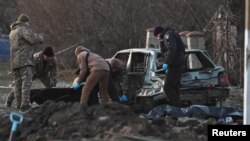The White House condemned the latest Russian strikes against Ukraine, saying they are a reminder of Russian President Vladimir Putin's brutality.
U.S. Secretary of Defense Lloyd Austin and his Ukrainian counterpart, Oleksii Reznikov, condemned Russia's brutal air attacks on Ukraine's civilian infrastructure. Austin also expressed the United States' unwavering "commitment to support Ukraine's ability to counter Russia's war of aggression," a Pentagon statement said.
Austin again emphasized air defense as a top priority for U.S. security assistance efforts, as demonstrated by commitments to provide Ukraine with additional munitions for U.S.-provided NASAMS — advanced surface-to-air missile systems — as well as capabilities to counter unmanned aerial systems.
In his nightly video address, Ukrainian President Volodymyr Zelenskyy said four people were killed in Russia's massive strikes Monday.
"Only dismantling Russia's terrorist capabilities, liberating our entire land, and bringing the murderers to justice can ensure peace," he said.
Early Monday, Ukrainian officials reported heavy Russian missile strikes across the country. Air raid sirens blared, urging civilians to seek shelter.
The massive missile attacks on homes, buildings and power infrastructure, which Ukrainian authorities had been anticipating, underscore Russia's strategy to leave Ukraine without energy, heat and water in the dead of winter.
State grid operator Ukrenergo confirmed that Russia had hit energy infrastructure facilities, leading to emergency power outages in Ukraine.
However, the nationwide power system remains functioning and intact, Ukrainian Prime Minister Denys Shmyhal said.
Ukrainian media reported explosions in several areas south of Kyiv, including Cherkasy, Kryvyi Rih and the Black Sea port of Odesa, where the water company said power was out to pumping stations, leaving the city without water.
"The enemy is again attacking the territory of Ukraine with missiles!" Kyrylo Tymoshenko, deputy head of the Ukrainian president's office, wrote on Telegram.
Tymoshenko said two people were killed and three others were injured, including a 22-month-old child, in the village of Novosofiyivka in the southern Zaporizhzhia region.
U.S. Secretary of State Antony Blinken accused Russia of "trying to weaponize winter" and undermine the morale of the Ukrainian people with its barrage of airstrikes in recent weeks targeting Ukrainian power and water supplies.
"This is indeed barbaric," he said on CNN's "State of the Union" Sunday.
Ukrainian air force spokesman Yuriy Ihnat said land-based missiles were launched from southern Russia and shipborne missiles from the Caspian and Black seas. Russian strategic bombers also launched missiles, he said.
Meanwhile, Moscow said Monday that Ukrainian drones had attacked two air bases deep inside Russia, hundreds of miles from the front lines.
One attack reportedly occurred at a base that houses nuclear-capable strategic bombers that have been launching strikes against Ukraine.
In a video address on Monday, Zelenskyy said Ukraine’s air defenses shot down most of the Russian missiles fired at the country, and energy workers had begun work on restoring power supplies.
"I would like to thank our air defense forces, our energy workers and our people. The air defense shot down most missiles. The energy workers have begun restoring power supplies. Our people never give up," he said.
Ukraine's air force command said it shot down more than 60 of 70 missiles launched by Russia. Moscow says it hit all 17 of its targets, BBC reported.
Meanwhile, Russian state television on Monday showed Putin driving a Mercedes across the Crimean Bridge linking southern Russia to the annexed Crimean Peninsula, less than two months after an explosion tore through one of the Kremlin chief's showcase infrastructure projects.
Putin, accompanied by Deputy Prime Minister Marat Khusnullin, inspected the bridge and the point where the attack took place in October.
Russia's latest barrage comes on the heels of the decision Friday by the Group of Seven leading industrial nations and Australia to cap Russian seaborne oil at $60 a barrel. Russia said the measure will not put a dent in its economy.
Russian energy chief, Deputy Prime Minister Alexander Novak, said Sunday that Moscow will not sell oil that is subject to a Western price cap, even if it has to cut production.
Novak called the price cap a gross interference in world energy trade, an action that could lead to a supply shortage.
The White House said Monday that it was not surprised by Russia's reaction.
Press secretary Karine Jean-Pierre said the cap could be adjusted over time to prevent Russia from profiting from the war in Ukraine while keeping Russian crude in the market.
"The cap at $60 per barrel at this level maintains clear intentions for Russia to keep producing," she said.
John Kirby, White House national security spokesperson, also told reporters that an oil price cap would not have any long-term impact on global oil prices.
Secretary of State Blinken said Sunday that the cost of Western sanctions on Russia is mounting daily, making it more difficult for Moscow to replenish its weaponry to advance its ongoing war with Ukraine.
With trade controls imposed by the United States and its allies, Blinken said Russia cannot import the parts it needs to build more weapons to replace the ones that have been destroyed on the battlefields of Ukraine or sometimes abandoned as Moscow's forces have retreated in the face of Ukrainian advances.
"The costs are accumulating every day. The burden on Russia gets heavier every day," he told CNN's "State of the Union" program.
Some information in this report came from The Associated Press, Reuters and Agence France-Presse.











